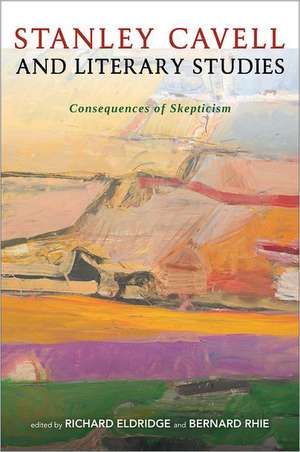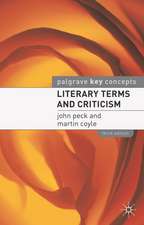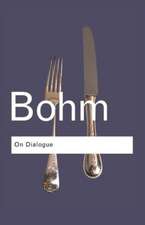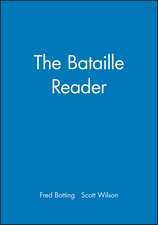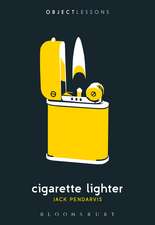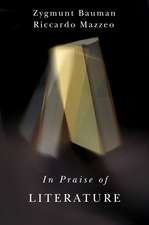Stanley Cavell and Literary Studies: Consequences of Skepticism
Editat de Professor Richard Eldridge, Dr Bernard Rhieen Limba Engleză Hardback – 23 noi 2011
| Toate formatele și edițiile | Preț | Express |
|---|---|---|
| Paperback (1) | 237.75 lei 6-8 săpt. | |
| Bloomsbury Publishing – 23 noi 2011 | 237.75 lei 6-8 săpt. | |
| Hardback (1) | 879.74 lei 6-8 săpt. | |
| Bloomsbury Publishing – 23 noi 2011 | 879.74 lei 6-8 săpt. |
Preț: 879.74 lei
Preț vechi: 1205.13 lei
-27% Nou
Puncte Express: 1320
Preț estimativ în valută:
168.35€ • 174.77$ • 140.38£
168.35€ • 174.77$ • 140.38£
Carte tipărită la comandă
Livrare economică 25 martie-08 aprilie
Preluare comenzi: 021 569.72.76
Specificații
ISBN-13: 9781441164957
ISBN-10: 1441164952
Pagini: 288
Dimensiuni: 138 x 216 x 25 mm
Greutate: 0.45 kg
Editura: Bloomsbury Publishing
Colecția Continuum
Locul publicării:New York, United States
ISBN-10: 1441164952
Pagini: 288
Dimensiuni: 138 x 216 x 25 mm
Greutate: 0.45 kg
Editura: Bloomsbury Publishing
Colecția Continuum
Locul publicării:New York, United States
Caracteristici
Will
appeal
to
a
broad
academic
readership
of
students
and
scholars
in
literary
studies
and
philosophy.
Notă biografică
Richard
Eldridge
is
the
Charles
and
Harriett
Cox
McDowell
Professor
of
Philosophy
at
Swarthmore
College,
PA,
USA.
He
is
the
author
and
editor
of
numerous
books
in
philosophy
and
literature,
including,
as
editor,
The
Oxford
Handbook
of
Philosophy
and
Literature
(OUP,
2009)
and
Stanley
Cavell
(CUP,
2003,
2008),
and
as
author,
Literature,
Life,
and
Modernity
(Columbia
University
Press,
2008),
An
Introduction
to
the
Philosophy
of
Art
(CUP,
2004),
On
Moral
Personhood:
Philosophy,
Literature,
Criticism,
and
Self-Understanding
(University
of
Chicago
Press,1989),
and
Leading
a
Human
Life:
Wittgenstein,
Intentionality,
and
Romanticism
(University
of
Chicago
Press,
1997).Bernard
Rhie
is
Associate
Professor
of
English
at
Williams
College,
USA.
Cuprins
Notes
on
ContributorsAbbreviations1.
Introduction:
Cavell,
Literary
Studies,
and
the
Human
Subject:
Consequences
of
Skepticism
Richard
Eldridge
and
Bernard
RhieI.
Principles2.
The
Adventure
of
Reading:
Literature
and
Philosophy,
Cavell
and
Beauvoir
Toril
Moi3.
"Is
'Us'
Me?"
Cultural
Studies
and
the
Universality
of
Aesthetic
Judgments
R.
M.
Berry4.
Cavell
and
Kant:
The
Work
of
Criticism
and
the
Work
of
Art
Anthony
J.
Cascardi5.
Cavell
and
Wittgenstein
on
Morality:
The
Limits
of
Acknowledgment
Charles
Altieri6.
The
Word
Viewed:
Skepticism
Degree
Zero
Garrett
Stewart7.
A
Storied
World:
On
Meeting
and
Being
Met
Naomi
Scheman8.
Skepticism
and
the
Idea
of
an
Other:
Reflections
on
Cavell
and
Postcolonialism
Simona
Bertacco
and
John
GibsonII.
Practices9.
William
Shakespeare
and
Stanley
Cavell:
Acknowledging,
Confessing,
and
Tragedy
Sarah
Beckwith10.
Competing
for
the
Soul:
Cavell
on
Shakespeare
Lawrence
F.
Rhu11.
"Communicating
with
Objects":
Romanticism,
Skepticism,
and
"The
Specter
of
Animism"
in
Cavell
and
Wordsworth
Joshua
Wilner12.
Emerson
Discomposed:
Skepticism,
Naturalism,
and
the
Search
for
Criteria
in
"Experience"
Paul
Grimstad13.
Beside
Ourselves:
Near,
Neighboring
and
Next-to
in
Cavell's
The
Senses
of
Walden
and
William
Carlos
Williams's
"Fine
Work
with
Pitch
and
Copper"
Elisa
New14.
For
all
You
Know
Andrew
H.
Miller15.
Empiricism,
Exhaustion,
and
Meaning
What
We
Say:
Cavell
and
Contemporary
Fiction
Robert
ChodatSelect
BibliographyIndex
Recenzii
"A
serious
encounter
between
literary
theory
and
ordinary
language
philosophy
is
long
overdue.
This
stimulating
collection
of
essays
is
an
indispensable
resource
for
literary
critics
curious
about
Cavell
and
anyone
eager
to
strengthen
and
deepen
the
relations
between
philosophy
and
literature."
--
Rita
Felski,
William
R.
Kenan,
Jr.,
Professor
of
English,
University
of
Virginia,
USA,
and
Editor,
New
Literary
History
"In making good on its important effort to encourage and enact a rapprochement between Cavell and literary criticism, Stanley Cavell and Literary Studies is splendid testimony to one of this thinker's extraordinary strengths: his gift for inspiring brilliant minds to engage him in arguments about matters that are of compelling concern to readers across the humanities. This is a scintillating collection of passionately argued essays." -- Ross Posnock, Anna Garbedian Professor of the Humanities, Department of English and Comparative Literature, Columbia University, USA
"As Cavell's work restores emotional drama to ordinary language philosophy by attending to the literary, so does this splendid collection reenergize literary studies by bringing it into conversation with Cavell. Genres as diverse as Shakespearean tragedy, American Romanticism, and contemporary fiction reveal their commonalities here as confrontations with, and attempts to repair, the skeptical rupture between self and otherness. Through these searching essays, we are led to recognize anew the way writing functions both as withdrawal from the world and as an affirmation of the potentialities of our common language." -- Jennifer Fleissner, Associate Professor of English, Indiana University Bloomington, USA
It is worth saying that, while most contributors exhibit real sympathy with Cavell's preoccupations and perceptions, there is no shortage of critical questioning of both their finer details and broader implications. [.] The resulting essays have been divided into two groups: those primarily addressing matters of theory or principle and those primarily developing readings of individual authors and texts (although, as the editors make clear, some are less easy to subsume with such taxonomy than others). And the collection contains many examples of work in both categories that genuinely helps illuminate either the true nature of Cavell's work or the kinds of approach in literary studies that most deeply resist and most naturally invite engagement with it (in all its idiosyncrasy).
In this fine collection of essays, the energy of long-standing engagements with [Cavell's] philosophical legacy animates discussions of the relation between philosophy and literature and of the nature of aesthetic criticism more broadly. [.] The authors of the essays in this collection take up the challenge posed by an ordinary language approach to criticism with originality and vigor.
Stanley Cavell and Literary Studies: Consequences of Skepticismmarks a fruition of the available criticism on Cavell's relation to literary studies. I t conveys the sense of a thorough assimilation of Cavell's project that reflects a deep-and sometimes long-acquaintance with it on the part of many of the contributors. [...] This volume is specialized but accessible, and evinces a real companionship of endeavor without being protective or exclusive. More in the spirit of Cavell's work than to the letter of it, this companionship permits disagreement, divergence of opinion, and even critique. S uch an attitude is a better compliment than reverence, showing both seriousness of engagement and, for some, true intellectual influence. [...] The collection as a whole is a rich exploration of Cavell's relation to literary studies, and a broader statement of belief in the dividends of reading.
"In making good on its important effort to encourage and enact a rapprochement between Cavell and literary criticism, Stanley Cavell and Literary Studies is splendid testimony to one of this thinker's extraordinary strengths: his gift for inspiring brilliant minds to engage him in arguments about matters that are of compelling concern to readers across the humanities. This is a scintillating collection of passionately argued essays." -- Ross Posnock, Anna Garbedian Professor of the Humanities, Department of English and Comparative Literature, Columbia University, USA
"As Cavell's work restores emotional drama to ordinary language philosophy by attending to the literary, so does this splendid collection reenergize literary studies by bringing it into conversation with Cavell. Genres as diverse as Shakespearean tragedy, American Romanticism, and contemporary fiction reveal their commonalities here as confrontations with, and attempts to repair, the skeptical rupture between self and otherness. Through these searching essays, we are led to recognize anew the way writing functions both as withdrawal from the world and as an affirmation of the potentialities of our common language." -- Jennifer Fleissner, Associate Professor of English, Indiana University Bloomington, USA
It is worth saying that, while most contributors exhibit real sympathy with Cavell's preoccupations and perceptions, there is no shortage of critical questioning of both their finer details and broader implications. [.] The resulting essays have been divided into two groups: those primarily addressing matters of theory or principle and those primarily developing readings of individual authors and texts (although, as the editors make clear, some are less easy to subsume with such taxonomy than others). And the collection contains many examples of work in both categories that genuinely helps illuminate either the true nature of Cavell's work or the kinds of approach in literary studies that most deeply resist and most naturally invite engagement with it (in all its idiosyncrasy).
In this fine collection of essays, the energy of long-standing engagements with [Cavell's] philosophical legacy animates discussions of the relation between philosophy and literature and of the nature of aesthetic criticism more broadly. [.] The authors of the essays in this collection take up the challenge posed by an ordinary language approach to criticism with originality and vigor.
Stanley Cavell and Literary Studies: Consequences of Skepticismmarks a fruition of the available criticism on Cavell's relation to literary studies. I t conveys the sense of a thorough assimilation of Cavell's project that reflects a deep-and sometimes long-acquaintance with it on the part of many of the contributors. [...] This volume is specialized but accessible, and evinces a real companionship of endeavor without being protective or exclusive. More in the spirit of Cavell's work than to the letter of it, this companionship permits disagreement, divergence of opinion, and even critique. S uch an attitude is a better compliment than reverence, showing both seriousness of engagement and, for some, true intellectual influence. [...] The collection as a whole is a rich exploration of Cavell's relation to literary studies, and a broader statement of belief in the dividends of reading.
Descriere
A
groundbreaking
and
timely
collection
that
draws
out
the
full
implications
of
Stanley
Cavell's
writings
and
ideas
for
literary
studies.
